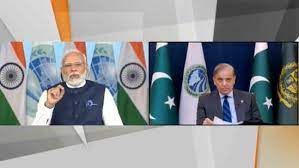The Shanghai Cooperation Organisation (SCO) Leaders’ summit held virtually on Tuesday concluded with a joint communique ‘New Delhi Declaration’; along with two separate joint statements, one on ‘cooperation in countering radicalisation leading to separatism, extremism, terrorism’; and the other on ‘digital transformation’.
During the summit, the SCO Heads of State Council approved the SCO Economic Development Strategy for 2030.
Decisions were also made on completing the procedure for admitting the Islamic Republic of Iran to the Shanghai Cooperation Organisation and granting it the status of an SCO member state.
The SCO Heads of State Council also signed the Memorandum of Obligations of the Republic of Belarus, in order to obtain the status of an SCO member state.
Further, they also announced the city of Almaty, Kazakhstan, as the SCO Cultural and Tourism Capital in 2023–2024.
INDIA SLAMS PAKISTAN ON TERRORISM
Addressing the leaders at the summit, Prime Minister Narendra Modi said, “Terrorism has become a major threat to regional and global peace. Dealing with this challenge requires decisive action. Regardless of its form or manifestation, we must unite in our fight against terrorism.”
Making a reference to Pakistan, PM Narendra Modi said, “Some countries use cross-border terrorism as an instrument of their policies and provide shelter to terrorists. SCO should not hesitate to criticise such nations. There should be no place for double standards on such serious matters.”
To PM Modi’s remarks, Pakistan Prime Minister Shehbaz Sharif alleged “minority persecution” in India. He also said India should not use terrorism for “diplomatic point scoring”.
Further, in an attempt to corner India, Sharif said, “There can be no justification for the killing of innocent people, regardless of the cause or pretext. Similarly, religious minorities should never be demonised in the pursuit of domestic political agendas.”
Shehbaz Sharif’s statement comes at a time when minorities in Pakistan are facing severe persecution, including forced conversion, abduction, rape and forced marriage (of women and minor girls) from minority communities.
WHAT INDIA TOLD CHINA ON CONNECTIVITY
At the virtual summit, India also slammed China over ‘connectivity’ and respecting the sovereignty of other countries.
“Strong connectivity is crucial for the progress of any region. Better connectivity not only enhances mutual trade but also fosters mutual trust. However, in these efforts, it is essential to uphold the basic principles of the SCO charter, particularly respecting the sovereignty and regional integrity of the Member States,” Prime Minister Narendra Modi said.
All current SCO member nations, barring India and Russia, are part of China’s BRI (Belt and Road Initiative), which India objects to, since a major part of its project in Pakistan runs through the Pakistan-Occupied Kashmir (PoK), called the China-Pakistan Economic Corridor (CPEC).
Upon being asked if Prime Minister Narendra Modi referred to the BRI project of China, Foreign Secretary Vinay Kwatra said, “The references to sovereignty and territorial integrity came both in the context of the SCO charter as also in the context of the connectivity projects. In fact, connectivity was one of the key areas of focus in terms of coop among the SCO member states.”
“The PM clearly said that connectivity is good and important but it has to be respectful of concerns related to sovereignty and territorial integrity in which India’s position on connectivity and how it interfaces with BRI, is clear,” he added.
However, overlooking India’s concerns, Chinese President Xi Jinping defended BRI and said, “This year marks the 10th anniversary of the Belt and Road Initiative proposed by me. China will hold the third ‘Belt and Road’ International Cooperation Summit Forum. All parties are welcome to participate in the activities of the forum and jointly pave the road to happiness that benefits the world.”
Commenting on the CPEC project, Pakistan PM Shehbaz Sharif said, “The China-Pakistan Economic Corridor, a flagship project of the Belt and Road Initiative, can be a force multiplier not only for regional connectivity but also for regional stability, peace and prosperity.”
China’s focus, however, was the West, as was that of Russia.
In his opening remarks, Chinese President Xi Jinping said, “We uphold international fairness and justice, oppose hegemonic and bullying practices, expand the “circle of friends” of the organization, and build a partnership of dialogue rather than confrontation and partnership rather than alliance, strengthening the progressive force for maintaining world peace and stability.”


